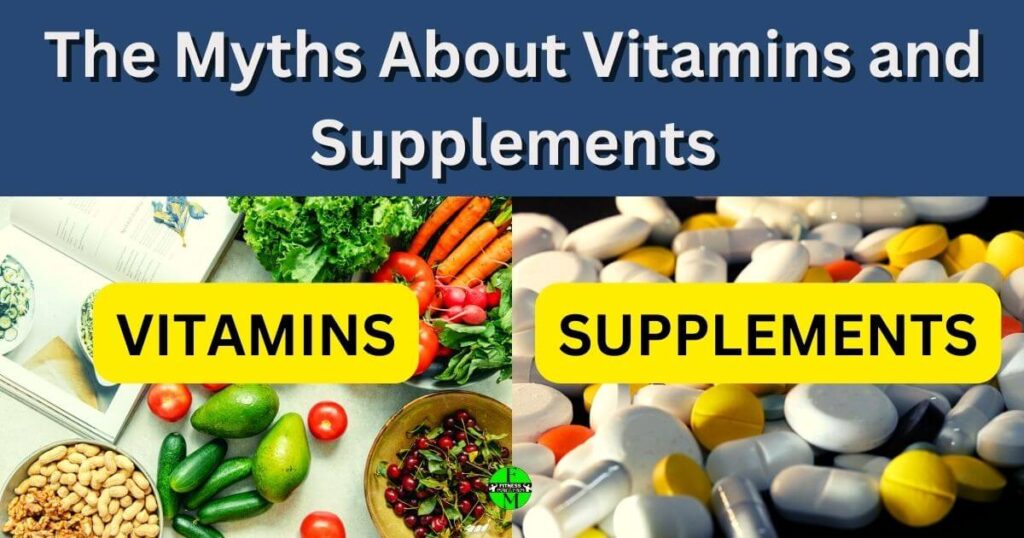The Myths About Vitamins and Supplements: There is so much false information about vitamins and supplements that it is hard to know what to believe. Manufacturers frequently make misleading claims, as do self-proclaimed health gurus and other well-intentioned individuals who simply do not know what they are talking about. Numerous misconceptions and myths have emerged regarding vitamins and supplements as a result of people’s desire to believe that they will work miracles for them. Hence in this article we will try to give some information, few myths and facts related to vitamins and supplements. The myths about vitamins and supplements which are given here are based internet research done through different website article related to vitamin and supplements.

The Myths About Vitamins and Supplements
Myth #1: Supplements and Vitamins treat illness.
Facts: Vitamins and supplements can aid in disease prevention, disease treatment, and disease relief; yet, nutrients and enhancements alone can’t fix illness. Vitamins should never be used in place of prescribed medication or medical care for the seriously ill. Vitamins and supplements’ primary benefit is their ability to prevent disease. Take beta carotene, for instance, if you have a family history of cancer to prevent the disease before you show any symptoms.
Myth#2: Supplements And Vitamins Are Not Drugs.
Facts: Some people take vitamins and supplements seriously, while others take them like candy and don’t think they do anything significant. In this case, the truth is somewhere in the middle. Although technically not medications, vitamins and supplements can have the same effects when taken in the right amounts. Concentrates on that analysts lead with higher portions of nutrients and enhancements demonstrate the way that these sorts of dosages can have practically a similar impact as genuine prescription. They can interact with other medications and cause serious side effects when taken in large quantities. In this way, while in fact nutrients are not medication, they ought to be taken as are they.
Myth#3: You Can’t Take Such A Large Number Of Nutrients And Supplements.
Facts: False to the extreme. There are a few nutrients and enhancements that can be lethal when taken in high dosages or for a really long time a timeframe. Niacin, iron, vitamins A and D, and liver damage, heart disease, nerve loss, and an increased risk of cancer are all potential side effects of these nutrients. Other supplemental excesses can create milder clinical issues like looseness of the bowels, stomach agony, and restlessness. Some vitamins will also cancel one another out when taken in large quantities together. For instance, taking too much extra zinc can cancel out any copper you may be taking.
Myth#4: Every Vitamin Is The Same.

Facts: Since a substance is named “L-ascorbic acid” doesn’t imply that it will have a similar strength as each and every other “L-ascorbic acid” on the rack. For instance, researchers have questioned whether the effectiveness of synthetic vitamin C is comparable to that of vitamin C produced from rosehips or other natural substances. Because vitamins come in so many different forms and come from so many different places, it’s important to read labels and shop smart. You will get the vitamins you need in the right quantity and form this way.
Myth#5: Everything On The Label Is True.
Facts: The main thing that is valid about any nutrient or supplement is what you read from free investigations or writing. In order to increase sales, many manufacturers make false claims based on research or information. If a vitamin or supplement’s label contains claims that don’t seem plausible, then it probably isn’t. In order for the manufacturer to make a sizable profit, many of these claims are made in order to significantly raise the price. Conserve your cash. A supplement that costs twice as much as the others does not necessarily perform better.
Myth#6: Vitamins And Supplements Can Replace Healthy Eating
Facts: You can’t eat junk food and take a supplement every day and think it will help. The only thing it will do for you is make you feel less guilty about your bad eating habits if you only eat junk food and take a multivitamin every day. Supplements are exactly what they say they are: in addition to healthy eating. They absolutely cannot take its place.
Why Do We Need Vitamins?
The body can’t function properly without vitamins. They facilitate cell building and repair, support the immune system, and regulate energy levels and metabolism. Additionally, vitamins are involved in the production of hormones, enzymes, and other substances that are necessary for good health. The body is unable to function properly and may be vulnerable to a variety of health issues if vitamin deficiencies persist.
Difference Between Vitamins and Supplements.
The distinction between vitamins and supplements is that supplements are chemical compounds or extracts from plants or animals that are taken to supplement a person’s daily diet, whereas vitamins are natural substances found in food. While supplements may provide additional nutrients or other beneficial components, such as herbs or plant extracts, vitamins typically provide the essential nutrients that the body requires to maintain its health.
Advantages and disadvantages of vitamin supplements

Pros.
- Vitamins supplements and minerals can help us by providing nutrients that aren’t in the diet and provide missing vitamins and minerals.
- They can help to prevent certain vitamin deficiencies, such as those caused by poor diets.
- Vitamin supplements can help you stay healthy and active by increasing your immunity and energy levels.
- People with certain health conditions, like diabetes or heart disease, may benefit from them.
- Vitamin supplements may assist in slowing down aging.
Cons:
- Taking too many vitamin supplements can cause an imbalance of essential nutrients in the body.
- It is essential to adhere to the recommended dosage for certain vitamins and minerals because taking large quantities of them can be harmful.
- Before taking vitamin supplements, always check with your doctor because they may interact with some medications and other side effects.
- They may not be covered by insurance and can be costly.
- Vitamin supplements should not be used in place of healthy food or as a substitute for a healthy diet.
FAQ: Frequently Asked Questions
What kinds of vitamins and supplements should I take?
It’s best to talk to your doctor about which kinds of vitamins and supplements are best for you. The following are some of the most frequently taken vitamins and supplement : Vitamin D, Omega-3 fatty acids, Multivitamins, Probiotics, Calcium, Magnesium, Iron, and Vitamin C.
What vitamins should not be taken in high doses as a supplement, and why?
Vitamins A, D, E, and K should not be taken in high doses as a supplement because they can be toxic when taken in excess? Taking too many of these vitamins can result in symptoms like nausea, headaches, and fatigue, as well as more serious problems like damage to the liver and kidney failure.
Which is better b12 supplement and b12 vitamins?
This is a difficult question to answer because it depends on your specific requirements and objectives. For the most part, B12 supplements are more bioavailable than B12 nutrients and certain individuals might find them simpler to absorb, yet certain individuals might favor the comfort of a B12 nutrient. In the end, it’s important to talk to your doctor about which B12 form works best for you.
When I turn 50, what kinds of vitamins and supplements should I take?
Your individual health and lifestyle requirements will determine the best vitamins and supplements to take at 50. Omega-3 fatty acids, vitamin D, calcium, and probiotics are some of the supplements that are frequently suggested for people over 50. To find out which vitamins and supplements are best for you, consult your physician or another healthcare professional.
Vitamins and supplement that cause erectile dysfunction?
There is no evidence that any vitamins or supplements can cause erectile dysfunction. Erectile dysfunction, on the other hand, can be caused by smoking, excessive alcohol consumption, substance abuse, and certain medications. If you’re having trouble getting an erection, it’s important to talk to your doctor.
Related
- Men’s mental health month
- Forbidden Weight loss Secrets
- Red Boost Dietary Supplement
- Fluxactive Complete Supplement Reviews
- What is bf.7 Variant? Everything you need to know
Disclaimer: The details & information given here in this article is based on information as available on other published site on internet. Do take medical advice before adopting it. Fitness Mantram Does Not Confirm It. This site contains affiliate links. If you choose to make a purchase after clicking a link the author/owner/creator may receive a commission at no ADDITIONAL cost to you. Thank you for your support!

3 thoughts on “The Myths About Vitamins and Supplements”